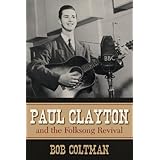
Average Reviews:

(More customer reviews)An extraordinarily well-documented and insightful view into the life and times of, perhaps, the finest interpreter of traditional folksong in the 20th century...and the movement that gave birth to the 1960s folk revival. Coltman writes with creativity and enthusiasm and an uncanny ability to interpret the life of a very complex character who dominated the folk scene in the U.S. in the 1950s...a truly gifted genius in the field of songwriting and performance, as well as a seer (he foresaw in early 1961 that Bob Dylan was destined to be a superstar!).
Through extensive interviews with both sides of Paul's family, we learn of the impact on him that came from his mother's side, and of the old ballads he learned orally from members of the Hardy family...most particularly the whaling ballads that had gained prominence in his hometown of New Bedford, Massachusetts. He listened eagerly and learned well...and shared his knowledge as widely as possible through radio (establishing his own program on a station in Charlotte Town, Prince Edward island, Canada, at the tender age of 16) and live performances and recording (not only of himself).
When Dylan responded to New York Times writer Robert Shelton's question as to which folksingers he admired, by saying "There's only one...and that's Paul Clayton...he's a spell", it encouraged Clayton to consider Dylan a disciple. And, while there is no hard evidence to support it (and Coltman does not prognosticate), there are those of us who had Paul as a personal friend for many years prior to his association with Dylan...as well as during those years) who believe that Paul's deep depression and eventual suicide were in some way connected to a cross-country tour that they (along with a couple of others) took together in early 1964...a trip which was described to me by Clayton as a "LOOK-SEE TOUR of AMERICA". Bob Coltman surmises that Paul became excess baggage, more or less, a position that would never have been acceptable to him.
For those of us who were not living or working in New York City in the mid 60s, Coltman has put together a fascinating word-picture of the events that occurred during the days leading up to Clayton's suicide, by electrocution, just a few short weeks after his 36h birthday in March 1967.
Coltman concludes his excellent book with an Appendix of Paul Clayton's copyrighted songs. And if this reviewer is to find any shortcoming at all in Coltman's work, I shall have to find it here. While he admits that he has not heard all of the songs, he still cannot resist making educated guesses. For example: He describes LAZY COURTSHIP as "maybe a takeoff on courting ballads like DEAF WOMAN'S COURTSHIP, whereas it is simply an alternative title to THE YOUNG MAN WHO WOULDN'T HOE CORN. JIM HARFIELD'S SON, he correctly concludes may be an original. Paul based the text of the song on documents from the trial in Frankfort, KY...something which Coltman could hardly be expected to know. So...the Appendix may not provide all the information about every single song, but it is an invaluable reference to the complete catalog of Clayton's copyrighted material.
Following the Appendix, a DISCOGRAPHIC provides complete and accurate information about Clayton's incredibly long list of recorded projects (Most-Recorded Folk Singer in the 1950s) including non-commercial transcriptions that can be heard at The Library of Congress, the Flanders Archive, or Kenneth Goldstein Archive, University of Massachusetts, Dartmouth.
NOTES, GENERAL INDEX, and INDEX OF SONG TITLES completes this "labor of love"...a treasure-trove of valuable information that deserves a special place in out hearts, and a place of honor on your bookshelf.
Bill Clifton
Click Here to see more reviews about: Paul Clayton and the Folksong Revival (American Folk Music and Folk Musicians)
Paul Clayton and the Folksong Revival is the first biography of the folk singer and song collector Paul Clayton (1931-1967). Preeminently a scholar-balladeer, Clayton is credited with the Top-Ten hit _Gotta Travel On_ and single-handedly brought hundreds of obscure folksongs to light for the mid-century radio and recording market. He influenced listeners and friends from Dave Van Ronk to Bob Dylan, who considered Clayton a mentor, _mindguard,_ and well of folksong.

0 comments:
Post a Comment